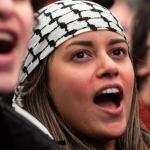Palestine, Academic Freedom and the Paradoxes of Western liberalism
Since the Hamas attacks of October 7th 2023, Palestinians living in the Gaza strip have faced continuous bombings, forced displacement, starvation, denial of health care and humanitarian aid.
These extreme conditions of life strikingly illustrate the ‘exception’ to the normative liberal standards of universal equality and humanity that Palestine has come to embody since the creation of Israel. But if the facts of war cannot be disputed, what is at stake is the polarisation of public debates and the repression of expressions of solidarity with Palestine. While Western governments and media have presented certain forms of violence as legitimate and made others unacceptable, political opinions have been controlled or brutally suppressed.
During this roundtable, we ask:
Under what conditions can Palestinians’ suffering and humanity be acknowledged and what do these conditionalities reveal about Western liberalism? (Ruba Salih)
What imaginary forms of belonging have been revived during the Gaza war and to what extent are these constructs structured by European antisemitism? (Ghassan Hage)
What arguments are used on US campuses to justify the policing of academic speeches? (Ilana Feldman)
How can anthropology as a discipline grounded in long-term fieldwork challenge polarizing discourses and dominant framings? (Emanuel Schäublin).
presentations & biographies
Can the Palestinian speak? - Ruba Salih
Ruba Salih is a Professor of Anthropology at the University of Bologna. Her research and writing cover transnational migration and diasporas across the Middle East and Europe, colonisation and decolonisation, refugees and the Palestine question, gender memory and colonial traumas. She is a member of the Executive Board of Insaniyyat, the Society of Palestinian Anthropologists.

“Time, Place, Manner”: Policy Camouflage and the Policing of Academic and Political Speech on US Campuses – Ilana Feldman
Ilana Feldman is a Professor of Anthropology, History, and International Affairs at George Washington University. Her research has focused on the Palestinian experience, both inside and outside of historic Palestine, examining practices of government, humanitarianism, policing, displacement, and citizenship. She has conducted ethnographic and archival research in Gaza, the West Bank, Jordan, Lebanon, and Egypt.

Judeo-Christianity’ as an antisemitic construct during the Gaza war - Ghassan Hage
Ghassan Hage is a Future Generation Professor of Anthropology at the University of Melbourne. Hage works on the comparative anthropology of racism, nationalism and multiculturalism, particularly in Australia and the Middle East. He has written and conducted fieldwork on the Lebanese transnational diaspora in Australia, the US, Europe, Canada and Venezuela. He also researches and writes in social theory, particularly on the work of Pierre Bourdieu.

Speaking concretely: Anthropology and religious forms of life in Palestine and Israel - Emanuel Schäublin
Emanuel Schäublin is an anthropologist focusing on ethics and political conflict in the Arabic-speaking Middle East and Europe. In 2023, he published the monograph ‘Divine Money: Islam, Zakat, and Giving in Palestine’ based on extensive fieldwork in the city of Nablus and interviews across Palestine. Currently, he is a senior researcher at ETH Zurich and an independent screenwriter for film productions.

The event will be moderated by
Julie Billaud, Geneva Graduate Institute
Riccardo Bocco, Emeritus Professor, Geneva Graduate Institute
registration mandatory




